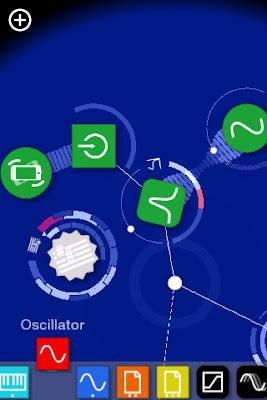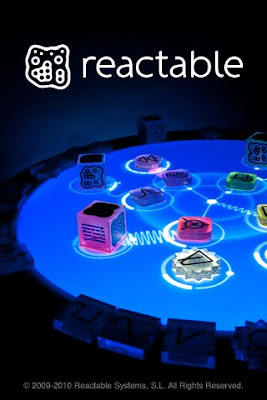
I still love my iPad -- to quote a friend who'd probably just as soon not have me mention her name, "it's the first thing I touch in the morning and the last thing I touch before I fall asleep", and that's as true for me as it is for her.
I have this fondness for "musical toys", and the iPad is probably the best platform for such things that's ever existed. Seriously. I mean, a PC is pretty good, but you add in the touch-screen and the light-weight hands-on aspect of the device, and it's just amazing. In fact, my plan is to use my current 32GB iPad as a dedicated music device when I upgrade to the iPad 2.0 (presumably) sometime later this year. 32GB will hold a lot of samples.
So I've spent a semi-embarrassing amount of money on music apps, and some of them are fun, but to date I've only found one, maybe two, that I'd really consider "musical instruments". There are a lot of "keyboard synthesizers" out there like minisythn PRO ($8.99), Pro Keys ($2.99), and NLogFree (free), and they're fun but just drawing a keyboard on the screen doesn't necessarily make it "musically useful". Thereminator ($2.99) scratched my Theremin itch, and Soundrop (free) is an entertaining and unique toy, almost a game: you draw lines on the screen and little dots drop down and make sounds as they bounce about.
TOPLAPapp (free) and iGendyn (free), both by experimental music pioneer Nick Collins will create some very "unique" sounds, based on some very interesting principles:
TOPLAPapp is ... a virtual machine for sound synthesis. This machine accepts a few valid instructions ... The machine rushes through the instruction set to create output sounds, which are usually of a somewhat noisy character, hopefully interestingly so. The historical antecedents include instruction synthesis as pioneered at the Institute of Sonology in the 1970s, and the live coding movement, of modifying a running program as it acts.
Cool, huh? I've had fun with it but it makes my wife leave the room, usually in a very bad mood. I'm not making this up.
MorphWiz ($9.99) comes close to being a real musical instrument. Jordan Rudess, who's the keyboard player for Dream Theatre, is one of the developers. It's more or less an iPad implementation of the Haken Continuum Fingerboard and it's fun to noodle around with -- but until they add MIDI output and / or the ability to load your own samples, it's sort've limited.
There are many "groove generator" apps out there, and I'm sure some of them are awesome -- but the few I've looked at tend to be a) very complicated and b) very poorly documented, with c) questionable levels of support. I won't single anyone out, but one thing you have to watch for in this space before you spend $9.99 or more is that no matter how spiffy it looks, the app itself may well be the creation of a single individual -- who may run off chasing another brilliant idea instead of releasing a new version with bug fixes.
All that having been said, the one app I've found so far that I consider to be a seriously useful musical tool is Reactable Mobile ($9.99). That's a screenshot of it at the top of this post, and here's the Reactable website with more video, pictures, and other information.
$9.99 is a little steep for an app, but IMHO, Reactable Mobile is worth every penny. It's a "smaller" version of an actual physical table device that costs about $10K:

I think I've actually played with one of these for a few minutes at SIGGRAPH, but the environment was so noisy that it really didn't make an impression on me. Suffice it to say that the concept maps really well onto the iPad, and that it's well documented, fun, easy to use, and full of features -- for instance, it has a built-in HTTP server that allows you to load your own samples. They have a moderately actively user community and a forum where people can share their compositions -- and the app includes a function to automagically upload shared compositions from the 'net.
The basic concept is that you have little icons that represent samples, oscillators, filters, and other synthesis objects, and you connect them together on the screen -- it's kind've like a visual programming language for something like SuperCollider, although I'm not sure if that's really a helpful description.
I love it, but it's probably not for everyone. You need to understand a little bit about how a synthesizer works, and the musical results tend to be either "grooves" or "ambient soundscapes". You can interact in real-time with the modules but really the system seems to promote improvisation more than repeatability. Again -- and speaking purely for myself -- I love it.
If you're curious, here are a few snippets I concocted with Reactable, none of which are destined to "make the charts, with a bullet!" But I had fun, and these days, the only reason I make music is to have fun doing it.
Krell 1 (1MB MP3)
Spooky 1 (672KB MP3)
Spooky 2 (602KB MP3)
[if you listened to these, especially the Krell sample, you'll hear one of the outstanding bugs in the system: it has a function that records the generated audio and renders it as a .WAV file, and for some reason it tends to be "noisy". I'm hoping they'll fix that soon. On the plus side, the Reactable developers seem to be interested in providing support for the app versus running off chasing butterflies].




